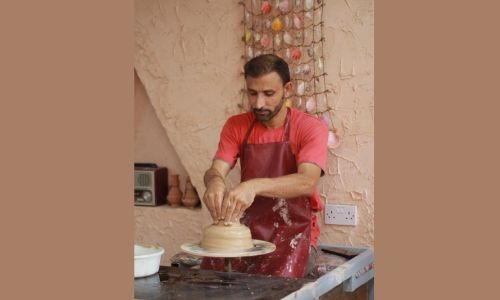Bahrain’s pottery tradition thrives against modernity
TDT | Manama
The Daily Tribune – www.newsofbahrain.com
Report by Zahra Ayaz
The art of pottery continues to thrive in Bahrain, preserving a tradition that has endured for centuries. Despite the era of mass production and modern technology, many Bahrainis still value the beauty and significance of handmade pottery in their daily lives.
Archaeologists have traced the origins of pottery in the kingdom back to 2300 BC, highlighting the enduring legacy of this ancient art form.
Today, pottery remains an integral part of Bahrain’s cultural heritage, with traditional methods and techniques passed down through generations. Haj Abdul Rasool, the proud owner of Taqseem Oasis Pottery, located in A’ali, shared his thoughts with The Daily Tribune.
He said: “There is a lot of demand for pottery in Bahrain, as people use it to decorate their homes with flowers or as functional utensils.
As a result, we have witnessed changes in the shapes and types of clay used.” Rasool emphasised the importance of passing down this ancient craft to the younger generation, stating, “The new generation should learn pottery because it is an ancient, advanced craft that nurtures a child’s imagination, encourages innovation and creativity, boosts self-confidence, and is incredibly enjoyable while developing valuable skills.”
Crafting pottery itself doesn’t require a significant amount of time, but the completion process is longer. Once the pottery is shaped, it must be left to dry in the sun before undergoing a 12-hour firing process in an oven.
After three days, the finished pottery emerges, showcasing the dedication and patience required to create these beautiful works of art.
Dedication
Rasool’s pottery shop is a living testament to the dedication of his ancestors, as it has been passed down through generations, preserving Bahrain’s tradition. Rasool expressed his passion for pottery, saying, “I am passionate about this profession because it is the heritage of our ancestors.
It allows us to think creatively and innovate.” To pass on his knowledge, Rasool offers pottery-making training for children aged one and a half years and older, aiming to nurture skills, self-expression, and confidence. The training sessions last for one hour and cost BD5.
Favourite destination
The pottery shops in A’ali have always been a favourite destination for locals, visitors, and children, attracting them with the artistry and craftsmanship displayed by the potters.
Visitors have the opportunity to witness the process firsthand, observing how pots are shaped using foot-operated wheels.
The finished pieces are then dried in the sun and placed in traditional kilns, some of which are built into ancient burial mounds from the Dilmun period.
Popular items include garden and plant pots, vases, children’s money pots, hubble-bubble pipe bases, candlesticks, light fittings, and more.
In recent years, innovative variations of traditional pottery have emerged, such as brightly painted money pots, items adorned with tiny seashells, and vases embellished with Arabic calligraphy and Quranic inscriptions.
Related Posts

